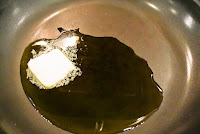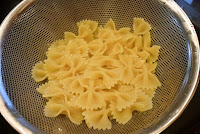Since the sauce cooks fast once you add the soy milk and gorgonzola mixture, start cooking pasta before starting to saute maitake and warabi for the sauce.
548 calories (1/2 of recipe); 21.6 g protein; 24.2 g fat; 59.8 g carbohydrate; 54.2 g net carbs; 234 mg sodium; 30 mg cholesterol; 5.6 g fiber
<Ingredients>
100-120 g maitake "hen of the woods" mushrooms (101 g in photo)
50-60 g warabi bracken (prepped; 60 g in photo)
20 g walnuts
30 g gorgonzola cheese
60 cc additive-free tonyu soy milk
1 tsp sakekasu sake lees
15 g parmesan cheese
10 g unsalted butter
10 g (slightly less than 1 tbsp) olive oil (not in photo)
<Directions>
1.
Bring to boil plenty of water for cooking pasta.
2.
Toast walnuts for 5+ minutes on low to medium low heat.
3.
Put sakekasu and gorgonzola cheese in soy milk in microwaveable container.
Microwave for 30-40 seconds.
Mix well, and set aside.
4.
Cut warabi into 3-4 cm, chop walnuts, and tear maitake into smaller sections.
5.
When water for pasta boils, cook pasta, aiming to finish at al dente stage.
If your pasta package only gives one cooking time, you should probably aim to drain 1-2 minutes before that time.
6.
Meanwhile, heat olive oil and butter in frying pan.
Saute maitake and warabi on medium heat for 1-2 minutes.
Add walnuts, and mix.
Add gorgonzola soy milk mixture, reduce heat, and simmer for 1 minute.
(If pasta is not ready at this point, remove from heat to prevent sauce from reducing too much.)
7.
Drain pasta well, add to sauce, and mix well.
8.
Add parmesan cheese, and mix well.
Ready to serve.
<Notes>
- Because of the sodium content of the sauce (two kinds of cheese) and briefly cooking pasta in the sauce at the end, no salt is added to pasta cooking water. If using less cheese, using more pasta or simply mixing pasta with sauce, boil pasta in salted water so that it would not taste bland. When salt is added to pasta cooking water, pasta takes in some sodium, easily 100+ mg, depending on the amount of salt.
- No bracken? Try this with ingen green beans -- they will add extra crunch and a fresh taste, which is very nice as the weather gets warmer.
- The sodium content largely depends on cheese. The above sodium content figure is based on using gorgonzola containing 298 mg sodium per 1 oz/28 g and parmesan containing 260 mg sodium per 1 oz/28 g.
- Nutrition figures when heavy cream is used: 667 calories (1/2 of recipe); 20.6 g protein; 38.4 g fat; 59.0 g carbohydrate; 53.7 g net carbs; 242 mg sodium; 70 mg cholesterol; 5.3 g fiber.




















No comments:
Post a Comment